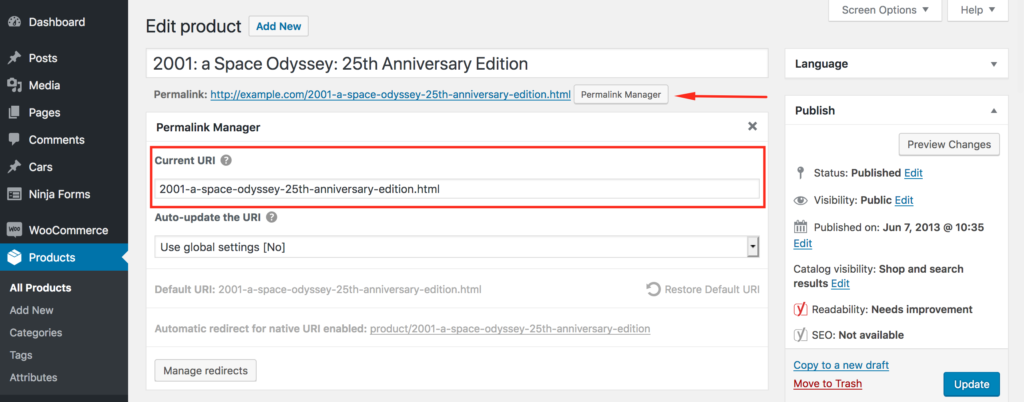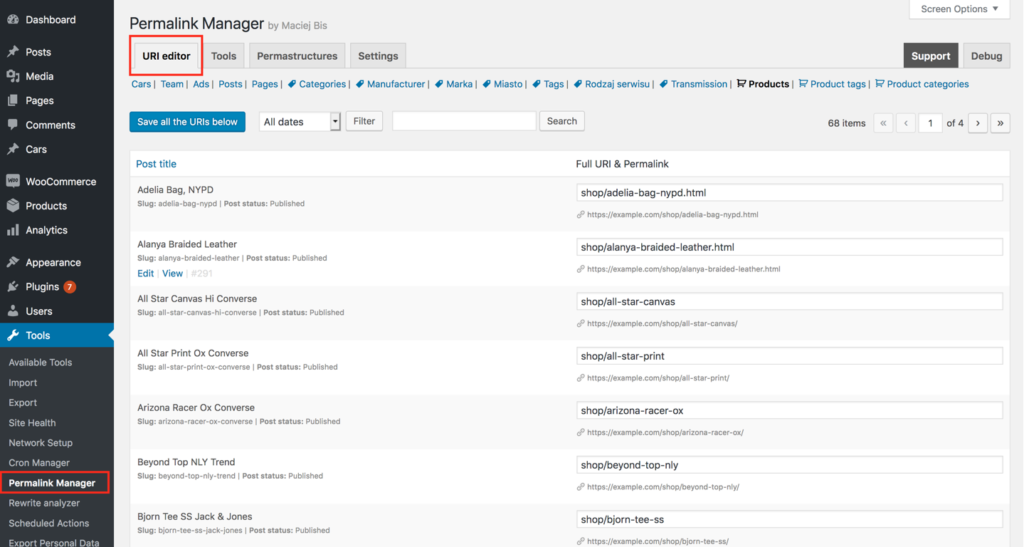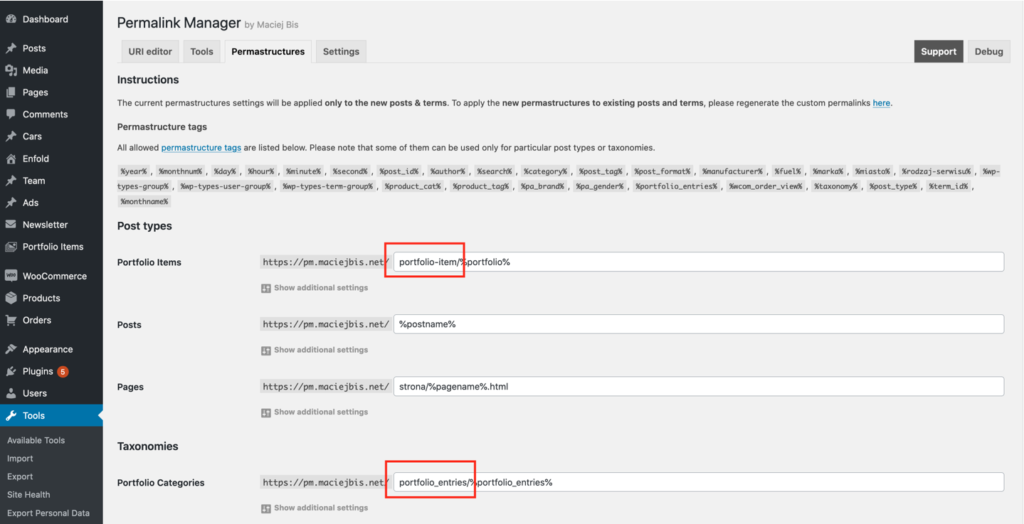Advanced Custom Fields (ACF) allows you to define Custom Post Types (CPTs) and Taxonomies directly within the WordPress dashboard. This makes it easier to build a website without editing theme or plugin files.
However, the permalink options available through ACF are limited and only support basic URL structures. If you need more control, Permalink Manager Pro lets you customize ACF permalinks freely directly from its settings, without writing any PHP code.
It is fully compatible with all custom post types and taxonomies created. The plugin operates independently from the built-in permalink system, allowing you to define any permalink structure and giving you complete control over ACF URLs.
Setting Up Permalink Manager for ACF Permalinks
Edit Individual Permalinks
The core feature of Permalink Manager is the built-in individual URL editor. It allows you to change the permalink for any custom post type or custom taxonomy created with ACF.
It works much like the standard WordPress permalink editor. The difference is that you are not limited to the slug (last part of the URL) and you can adjust the entire permalink.

Instead of editing URLs one by one, you can also change multiple permalinks at once. Separate sections for custom post types and taxonomies make it easier to work with larger websites.

Bulk Change URL Structures
If you need to quickly apply a new permalink structure to new posts or terms, the Permastructures editor is the simpleset solution. It allows you to customize permalinks for any content type, including removing the default slug or adding custom fields to WordPress permalinks.
By default, the plugin keeps existing URLs unchanged, but you can bulk update them to the new format using the "Regnerate/reset" tool.

ACF Permalink Customization Examples
How to Remove the /Post-Type/ Slug from ACF URLs?
The "rewrite slugs" make permalinks longer and harder to read. With Permalink Manager, you can remove the post type and taxonomy slugs from your content, resulting in cleaner, shorter URLs that are easier to understand and share.

Using the Same Permalink Base for Different ACF Content Types
Permalink Manager allows you to do more than just remove rewrite slugs from ACF permalinks. It can also be very useful if you want to implement silo architecture and use the same permalink structure to different types of content.

WordPress’ built-in permalink system is limited, and ACF alone does not allow to override it. Permalink Manager solves this by letting you assign custom permalinks to your content items.
This can be helpful for websites that organize content hierarchically with multiple post types or taxonomies. You can duplicate slugs and use the same permalink format for all of them to reflect relationships between them directly in the URL.
Adding ACF Taxonomies to CPT Permalinks
Permalink Manager lets you add the slug of custom taxonomy terms to the custom post type URLs.This makes the permalink even more descriptive and helps visitors understand the content hierarchy at a glance.

How to Add ACF Field Value to WordPress URL?
Permalink Manager Pro allows you to include ACF custom field values directly in your permalinks. This can make your URLs more descriptive and can help reflect data relationships or hierarchies stored in custom fields.
To use custom field meta keys in your permalinks, format them like
%__field_name%
, replacing field_name with your actual ACF field key. Once set up, Permalink Manager will automatically generate URLs based on the values of these fields whenever you save or update a post.

This works with a variety of ACF field types, including Text, Number, Relationship, Taxonomy, Select, Post Object, and Date Picker. You can include a single field or combine multiple fields in one permalink structure.
FAQ
Why ACF Permalinks Can’t Be Changed in WordPress Settings?
By default, WordPress requires a unique slug in the permalink structure for every custom post type and taxonomy. The built-in permalinks system depends on this slug to correctly resolve URLs and determine which content should load.
When WordPress parses a URL, it loops through the rewrite rules array and stops at the first matching rule. If multiple post types and taxonomies share the same permalink structure, WordPress applies only the first rule, ignoring the rest and displaying 404 errors for their items.
Custom post types and taxonomies created with ACF use WordPress’s standard permalink system. ACF does not change how these URLs are built, so the structure follows the post type or taxonomy slug you define, e.g.:
| Post type/taxonomy slug | Title | Final URL |
|---|---|---|
| jobs | Senior Barista | https://example.com/jobs/senior-barista/ |
| city | Brussels | https://example.com/city/europe/belgium/brussels/ |
If you need more granular control over your URL structures, Permalink Manager can work around this. It does not rely on standard rewrite rules. Instead, it checks the entire URL for an exact match.
This allows full permalink customization, including using the same permalink base for different post types or taxonomies.
How to Fix 404 Errors After Registering ACF Post Types
If your new custom post type items show a "Page Not Found" (404) error, it is likely because WordPress does not recognize the new link structure yet. To fix this, go to "Settings -> Permalinks" and click Save Changes to flush rewrite rules.
Another common cause is a slug conflict. If multiple content types use the same URL structure, WordPress load only the first matching content type and return "404 error" for other content types using the same URL structure.
Can I Use an ACF Relationship Field in a Permalink?
By default, you cannot use an ACF Relationship field directly inside a WordPress permalink structure. Since the Relationship field stores referenced post IDs rather than native rewrite variables, WordPress cannot resolve it automatically in the URL.
You can work around this limitation with the Permalink Manager. It allows you to include ACF Relationship field in custom permalinks, since the plugin stores permalinks statically rather than relying on the dynamic WordPress rewrite system.
Leave a Reply